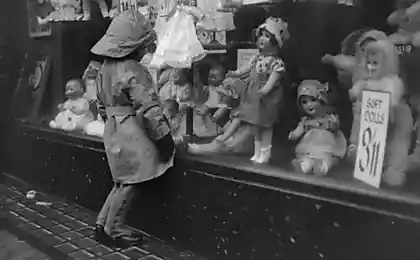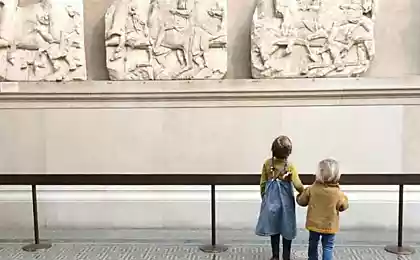584
Happy child: 3 simple rules for parents
Having a baby is one of the most important and long-awaited event for most parents. We strive to give our baby everything I can and to teach what they know. But the majority of even the most loving and caring parents make mistakes that can affect the child's future.
What is this error and what are the stages of child development they manifest?
When children are born their first years of life predetermined goals and desires of the parents. What color will the baby carriage, booties? What are the toys? Whether to go to the nursery? What kindergarten will give? What section will the story? Which school is better to go?
And you can already feel the catch?
The fact that these questions arise out of inertia and their flow does not stop even when the child's own desires and goals! And so, after the proposal, the readers have been divided into two categories: One is thinking now – I give my child a choice, of course only what will benefit him and that will help him in the future; My child is too young to make such important decisions, he does not know what is best for him – a second shout!

In the first case, you need to understand that from the point of view of the parents the wishes of the children are divided into two types: encourage or not encourage.
Encourage – those desires that parents deem necessary for a child.
Do not encourage – the child's wishes, which parents consider useless or even harmful for him.
In the first and in the second case, lots of other examples – from a choice of sports clubs to food preferences and television programs.
And here, often, is a complete Russian roulette, not the family! You "get" your child to Your interests – well, good smart kid! Do not "get" bad, wrong!
In the second case it is necessary to ask the question for parents – when do You think will be the age at which your child will make their own decisions – in 15, 20 years or maybe when he or she will have his own children? I wonder what people living in such conditions can teach their own children?
The danger of this position is that parents become dependent on their own desires. If we do not share the reins of responsibility for their actions and decisions to the child, thereby teaching him that his whole life does not depend on his actions. So no matter what you do, because everything will be not so much as you want! But then why do something to do?! Thus we have an egomaniac who all blame their misfortunes of others. Got a d – mom to blame in the whole house burnt out bulbs and even thought there is to change them – the dad is to blame – not taught!
What is in common between these two positions – one result, that is, zero. It turns out that the goals of the child are not taken into account, and at the same time it needs to take into account the interests of the parents. It turns out that in the framework of the educational process, we return to serfdom.
Parents with this position locked in, the situation is well described in the fable – and things are there!
Who, in our metaphor, is development. Swan, cancer and pike – you and your child. And who of you, who choose. Really in fact it turns out that parents are more important than "stretch horn" and to prove that their position is the right that they are stronger and don't need to argue with them, instead of together move toward a common goal – to develop independent, well-balanced personality?
The answer is simple: often, we first come up with what the child will do in life, and then under it is driven by purpose. In fact, all you need to do with accuracy Yes on the back.
In order to understand this issue better, first you need to understand the concepts which we appeal.
Goal – the desired result.
The challenge is that we need to do to achieve the goal.
For example, our goal is to purchase new curtains in the kitchen.
Our task in this case would be the following – to set aside money from paycheck, to advance to choose from the catalog any curtains, make sure they are available to specify all the necessary parameters to find the time to buy.
Same thing in education! Just a little bit harder. Most importantly, always, in all matters, even for education, ask yourself the question – Why?
Note that this question is very specific and is responsible for the presence of the target, because the answer to this question is not abstract "because", and "what would".
Examples:
Why do you need new curtains in the kitchen?
Because the old one I don't like (the purpose is not clear);
In order to visually expand the space (goal is clear).
What is dangerous to perform any action that is not clearly aware of the end result? If the example of the Russian roulette and fable are not enough, remember a wonderful Soviet cartoon "Golden antelope"
In short, the essence of the tale is that Raja gets tricked antelope from under the hooves where gold coins appear.
Why it was needed? Can be to give back to the neighboring Sheikh or to give money to the poor? No. Then what?
This response to the tale is simply no! He wanted gold just "because"! Without a purpose. Just because Raj North, there's a magic carpet, Rajah of the East wife turns into a bird, and he has nothing. He's just bored.
What does all this end? All the gold turns into shards, and Raja is drowning in them. To tell you all this greed? Here is a little more complicated, of course greed by default, a faithful companion of people who do not know how to answer the question why. It is obvious that the evil in the story must be punished, but for the moment will become cynical and imagine that Raja asked for a very specific amount – the Antelope, give me 100000$ for a new Annex to the Palace, for example. If he'd stayed alive and then you got what you want? We're not living in a fairy tale, we understand that such are the Rajahs, and in our world. But we have other tasks and in my opinion more important!
So if you, dear readers don't want to have all your gold turned into shards, You must follow 3 simple rules!
Rule # 1
Keep only those goals that you feel.
If you are not aware of why you do so – feel free to refuse to perform this action. Thus it is useful to construct a logical chain to your question.
Let us examine two examples of the conversation with the psychologist:
In the first case the father of the daughter came to therapy with the problem of admission to the UNIVERSITY. She and her daughter could not find a common language and the situation escalated to the limit.
I wish that our daughter got into medical school
Why?
-In order to get a decent education.
That is, in Your opinion, a decent education receive only medical students.
— You misunderstood me. I don't want to say it.
-Reframe the answer so that I understand YOU.
-I think that is the best option for my daughter.
Is the answer to the question why, and why not. So You want Your daughter just realized Your ambition.
I think the further course of the conversation clear.
The second example from the conversation of the psychologist with the boy's mother for 7 years.
Yesterday he deliberately threw the plate on the floor and it broke. I put it in the corner for 2 hours.
Why?
-What questions do you ask? Make sure he knows!
-Realized?
-That can not be beat!
-Well, a lot of which is not two – piece to, the dishes are not washed, the parents to be rude – if at all in a corner to put all my life so of inactivity.
-So I in all don't set, just for that!
-So what for it?
-Because in all other situations I knew how to respond, and in this case no.
From the response of my mother, we can conclude that she punished his son for his own ignorance of how to do in this situation.
Any action of the parents to the child should be meaningful and logical. Otherwise, the child will simply cease to understand the logic of actions of adults, which will lead to troubles, both personal and in relation to adults.
Rule # 2
Be interested in every manifestation of Your child.
Just to dot the "I", give an example from his practice.
To me comes the mother of 11-year-old boy with a request for the creation of his learning motivation.
— You know, I have a feeling that my baby you fool! He just is not interested.
-What makes You think that?
— Well, for example, last week went to a concert of classical music. It's great music, not what they are here for those BAM-BAM-BAM!
This music need to know, to feel. And my, excuse me, a blockhead all the way whined that the coffin he had seen all of my Bach with Mozart and it would be better if he sat at home and did not come out ever. And nconcert I pushed him so he fell asleep. Ruined my whole day!
After the mother talk, I offered her to model the following situation:
-Imagine that instead of You now on this chair sits Your son says to me – You know, I think my mother is stupid! She is not interested. Last week asked her to go to a concert Rammstein. It's just great music – what a drive, what emotions! The kind of music you need to know, and she whined that in a coffin I saw all these musicians, especially the soloist! Imagine what else she did at the concert I fell asleep right on time encore!
Feel the difference – I asked slightly taken aback mom after my words?
Of course, a lot of good composers, musicians and actors were "buried" us before we managed to reach an understanding.
But what is the moral of this story, and what left the child's mother?
The fact that the interests of a person formed from his needs. Needs, in turn, appear from the environment, culture, intelligence, etc. So with all these factors in a priori can not be the same interests as their parents. But this does not mean that they are not needed for his harmonious development. The morals and food for thought that adults find in "War and peace" children can find in "the little Mermaid" or even the infamous "wings" or "Luntik".
All this does not mean that the child does not need to instill a craving for beauty and not familiar with the classics of film, music, literature. It means only that the child simply does not have to like it and be interested in!
How so? — you will ask.
If we agreed that the interests of adults and children are equal, you will answer yourself to one question.
If you want your child to interested in YOUR interests, why you are interested in his pursuits, Hobbies?
Most likely, because I do not consider them important. In that case, why should he consider Your interests important? Just because you are his parents? This, unfortunately, is not enough.
I will allow myself one more example from personal experience.
My first position in education was the teacher in a boarding school.
I worked on seventh grade and I have never been able to make contact with girls who behaved apart from the rest of the class did not want to obey the General rules and I thought it was pretty strange uncle, who from them wants something. At some point I just stopped them, to demand something and lost it all on the brakes. It had to cease being an irritant. One day I approached him and asked for advice in what films can I watch and what books to read on the weekends. Me dry "threw" the series "Doctor Who" and the now popular writer Terry Pratchett.
The following weekend was stress – I finished a season and half of the book. Next week, when I approached the girls and began to share impressions they have looked at me with interest and began to share their impressions in response. After that I was able to share with them interesting to me literature and films in a similar genre. So at first we began to emerge a common interest, that is, I earned their authority and after we have never had any problems with isolation, neither with the regime nor with the behavior. This does not mean that I experienced the delight of watching the series and reading books, but I respected the children and they reciprocated me.
Why am I all that?
The fact is, if parents will be interested in the interests of the child, and the child, through the interest YOU will be interested in your Hobbies. Mind you, the child, it is impossible to impose, it can only be of interest!
Rule # 3
Never tell your child that he can't!
We have talked about what the child is interested in your interests, if you are interested in it. And this is an important fact for the development of a child. But what in addition we need to create conditions for the harmonious development of the interests of the child?
In fact, almost nothing except, of course of respect for his interests and encouragement. But even if for you it is difficult to divide the child's interest and you can't bring yourself to telling him – "well done", well Done that reading ( no matter what), well done, drawing ( in General, too, no matter what) that it's not the worst. If the child is really interested to do something, he will do it without your support. Most importantly, never, under any circumstances do not say that he can't or he's got something bad!
But how could this be asks a perfectly reasonable question parent – if he do not work? Do not get the cubes by color decompose properly, and fails, to ride a bike – crashes all the time, holding the handle wrong! We must also say that he is doing wrong! Either do properly or not taken at all.
A good illustration of the bad behavior of parents is social advertising, which was shown on TV about 4 years ago. In it, a boy stands in the middle of the room and to hear a parent's voice – You can do nothing; it's none of your business; Who you with their opinion; as soon as parents say these words, the room disappear awards for sporting achievements, family photos, hobby items etc. In my opinion it is great and even, not afraid to speak, almost exaggerated metaphor of the consequences of this attitude to the child. You say one sentence, and the child will disappear the whole world. Please remember these glory, when you want to tell your son or daughter that he or she can't do something!
But in this case, to make it right, if what the child is doing wrong and you need to fix it. Here is an example, which in one form or another, close to each parent.
Suppose you do wet cleaning at home, and your five year old daughter is interested in this process and offers help. What will be your actions - or refuse at your own risk offer, for example, to wash the kitchen floor? We are well aware that after such a cleaning the floor is likely to be dirty.
Show your child how, start doing with him, and after give a try on their own. After according to daughter the floor is cleaned, show that there are places that she missed, ask them to finish praise for the initiative, and once again check the result. But remember that in this case the goal is not to clean the floor, and encourage a child's interest for You and your business. Of course the floor will be washed and you likely still have to wash, but what is more important – clean the floor or the happy child?
It would seem so simple to follow that rule, but unfortunately parents believe that it is easier to do yourself and the child isn't old enough to take on a particular task. I have a very simple question for parents who think so — And when it becomes an adult? We have already addressed this issue earlier. When you trust him that didn't trust before? Maybe tomorrow? Or in a year? Or, when your child turns 30? Funny, isn't it? The guy is already 50, and he is the same notorious gender wash cannot or hammer a nail. A perfect illustration of the behavior of this fellow was in one of the editions of "jumble" — "BA-BU-shka!!!" — remember?
Refer to the example of our everyday work. Readers of this article who has subordinates will not lie, that they better know what and how to do it, but the authority has to delegate the work otherwise, at least, will cease to be fun, and at best will turn into hell, where your subordinates, and manipulated. And parent-child relations, the situation is exactly the same.
The conclusion here is very simple – trust your child and encourage his desire to help you. Believe me, he will thank You for it in the future.
After we dealt with all three rules, we can only wish the parents to be tolerant of children and always remember that you too once were children. Of course, these rules are not a panacea and they will not save You from all problems of education, but at least will help to create the conditions for more trust and friendly relations in the family. What else does a child need to be happy?!
Author: Eugene Langer.S. And remember, only by changing their consumption — together we change the world! ©
Join us in Facebook , Vkontakte, Odnoklassniki
Source: http:// Eugene Lange
What is this error and what are the stages of child development they manifest?
When children are born their first years of life predetermined goals and desires of the parents. What color will the baby carriage, booties? What are the toys? Whether to go to the nursery? What kindergarten will give? What section will the story? Which school is better to go?
And you can already feel the catch?
The fact that these questions arise out of inertia and their flow does not stop even when the child's own desires and goals! And so, after the proposal, the readers have been divided into two categories: One is thinking now – I give my child a choice, of course only what will benefit him and that will help him in the future; My child is too young to make such important decisions, he does not know what is best for him – a second shout!

In the first case, you need to understand that from the point of view of the parents the wishes of the children are divided into two types: encourage or not encourage.
Encourage – those desires that parents deem necessary for a child.
Do not encourage – the child's wishes, which parents consider useless or even harmful for him.
In the first and in the second case, lots of other examples – from a choice of sports clubs to food preferences and television programs.
And here, often, is a complete Russian roulette, not the family! You "get" your child to Your interests – well, good smart kid! Do not "get" bad, wrong!
In the second case it is necessary to ask the question for parents – when do You think will be the age at which your child will make their own decisions – in 15, 20 years or maybe when he or she will have his own children? I wonder what people living in such conditions can teach their own children?
The danger of this position is that parents become dependent on their own desires. If we do not share the reins of responsibility for their actions and decisions to the child, thereby teaching him that his whole life does not depend on his actions. So no matter what you do, because everything will be not so much as you want! But then why do something to do?! Thus we have an egomaniac who all blame their misfortunes of others. Got a d – mom to blame in the whole house burnt out bulbs and even thought there is to change them – the dad is to blame – not taught!
What is in common between these two positions – one result, that is, zero. It turns out that the goals of the child are not taken into account, and at the same time it needs to take into account the interests of the parents. It turns out that in the framework of the educational process, we return to serfdom.
Parents with this position locked in, the situation is well described in the fable – and things are there!
Who, in our metaphor, is development. Swan, cancer and pike – you and your child. And who of you, who choose. Really in fact it turns out that parents are more important than "stretch horn" and to prove that their position is the right that they are stronger and don't need to argue with them, instead of together move toward a common goal – to develop independent, well-balanced personality?
The answer is simple: often, we first come up with what the child will do in life, and then under it is driven by purpose. In fact, all you need to do with accuracy Yes on the back.
In order to understand this issue better, first you need to understand the concepts which we appeal.
Goal – the desired result.
The challenge is that we need to do to achieve the goal.
For example, our goal is to purchase new curtains in the kitchen.
Our task in this case would be the following – to set aside money from paycheck, to advance to choose from the catalog any curtains, make sure they are available to specify all the necessary parameters to find the time to buy.
Same thing in education! Just a little bit harder. Most importantly, always, in all matters, even for education, ask yourself the question – Why?
Note that this question is very specific and is responsible for the presence of the target, because the answer to this question is not abstract "because", and "what would".
Examples:
Why do you need new curtains in the kitchen?
Because the old one I don't like (the purpose is not clear);
In order to visually expand the space (goal is clear).
What is dangerous to perform any action that is not clearly aware of the end result? If the example of the Russian roulette and fable are not enough, remember a wonderful Soviet cartoon "Golden antelope"
In short, the essence of the tale is that Raja gets tricked antelope from under the hooves where gold coins appear.
Why it was needed? Can be to give back to the neighboring Sheikh or to give money to the poor? No. Then what?
This response to the tale is simply no! He wanted gold just "because"! Without a purpose. Just because Raj North, there's a magic carpet, Rajah of the East wife turns into a bird, and he has nothing. He's just bored.
What does all this end? All the gold turns into shards, and Raja is drowning in them. To tell you all this greed? Here is a little more complicated, of course greed by default, a faithful companion of people who do not know how to answer the question why. It is obvious that the evil in the story must be punished, but for the moment will become cynical and imagine that Raja asked for a very specific amount – the Antelope, give me 100000$ for a new Annex to the Palace, for example. If he'd stayed alive and then you got what you want? We're not living in a fairy tale, we understand that such are the Rajahs, and in our world. But we have other tasks and in my opinion more important!
So if you, dear readers don't want to have all your gold turned into shards, You must follow 3 simple rules!
Rule # 1
Keep only those goals that you feel.
If you are not aware of why you do so – feel free to refuse to perform this action. Thus it is useful to construct a logical chain to your question.
Let us examine two examples of the conversation with the psychologist:
In the first case the father of the daughter came to therapy with the problem of admission to the UNIVERSITY. She and her daughter could not find a common language and the situation escalated to the limit.
I wish that our daughter got into medical school
Why?
-In order to get a decent education.
That is, in Your opinion, a decent education receive only medical students.
— You misunderstood me. I don't want to say it.
-Reframe the answer so that I understand YOU.
-I think that is the best option for my daughter.
Is the answer to the question why, and why not. So You want Your daughter just realized Your ambition.
I think the further course of the conversation clear.
The second example from the conversation of the psychologist with the boy's mother for 7 years.
Yesterday he deliberately threw the plate on the floor and it broke. I put it in the corner for 2 hours.
Why?
-What questions do you ask? Make sure he knows!
-Realized?
-That can not be beat!
-Well, a lot of which is not two – piece to, the dishes are not washed, the parents to be rude – if at all in a corner to put all my life so of inactivity.
-So I in all don't set, just for that!
-So what for it?
-Because in all other situations I knew how to respond, and in this case no.
From the response of my mother, we can conclude that she punished his son for his own ignorance of how to do in this situation.
Any action of the parents to the child should be meaningful and logical. Otherwise, the child will simply cease to understand the logic of actions of adults, which will lead to troubles, both personal and in relation to adults.
Rule # 2
Be interested in every manifestation of Your child.
Just to dot the "I", give an example from his practice.
To me comes the mother of 11-year-old boy with a request for the creation of his learning motivation.
— You know, I have a feeling that my baby you fool! He just is not interested.
-What makes You think that?
— Well, for example, last week went to a concert of classical music. It's great music, not what they are here for those BAM-BAM-BAM!
This music need to know, to feel. And my, excuse me, a blockhead all the way whined that the coffin he had seen all of my Bach with Mozart and it would be better if he sat at home and did not come out ever. And nconcert I pushed him so he fell asleep. Ruined my whole day!
After the mother talk, I offered her to model the following situation:
-Imagine that instead of You now on this chair sits Your son says to me – You know, I think my mother is stupid! She is not interested. Last week asked her to go to a concert Rammstein. It's just great music – what a drive, what emotions! The kind of music you need to know, and she whined that in a coffin I saw all these musicians, especially the soloist! Imagine what else she did at the concert I fell asleep right on time encore!
Feel the difference – I asked slightly taken aback mom after my words?
Of course, a lot of good composers, musicians and actors were "buried" us before we managed to reach an understanding.
But what is the moral of this story, and what left the child's mother?
The fact that the interests of a person formed from his needs. Needs, in turn, appear from the environment, culture, intelligence, etc. So with all these factors in a priori can not be the same interests as their parents. But this does not mean that they are not needed for his harmonious development. The morals and food for thought that adults find in "War and peace" children can find in "the little Mermaid" or even the infamous "wings" or "Luntik".
All this does not mean that the child does not need to instill a craving for beauty and not familiar with the classics of film, music, literature. It means only that the child simply does not have to like it and be interested in!
How so? — you will ask.
If we agreed that the interests of adults and children are equal, you will answer yourself to one question.
If you want your child to interested in YOUR interests, why you are interested in his pursuits, Hobbies?
Most likely, because I do not consider them important. In that case, why should he consider Your interests important? Just because you are his parents? This, unfortunately, is not enough.
I will allow myself one more example from personal experience.
My first position in education was the teacher in a boarding school.
I worked on seventh grade and I have never been able to make contact with girls who behaved apart from the rest of the class did not want to obey the General rules and I thought it was pretty strange uncle, who from them wants something. At some point I just stopped them, to demand something and lost it all on the brakes. It had to cease being an irritant. One day I approached him and asked for advice in what films can I watch and what books to read on the weekends. Me dry "threw" the series "Doctor Who" and the now popular writer Terry Pratchett.
The following weekend was stress – I finished a season and half of the book. Next week, when I approached the girls and began to share impressions they have looked at me with interest and began to share their impressions in response. After that I was able to share with them interesting to me literature and films in a similar genre. So at first we began to emerge a common interest, that is, I earned their authority and after we have never had any problems with isolation, neither with the regime nor with the behavior. This does not mean that I experienced the delight of watching the series and reading books, but I respected the children and they reciprocated me.
Why am I all that?
The fact is, if parents will be interested in the interests of the child, and the child, through the interest YOU will be interested in your Hobbies. Mind you, the child, it is impossible to impose, it can only be of interest!
Rule # 3
Never tell your child that he can't!
We have talked about what the child is interested in your interests, if you are interested in it. And this is an important fact for the development of a child. But what in addition we need to create conditions for the harmonious development of the interests of the child?
In fact, almost nothing except, of course of respect for his interests and encouragement. But even if for you it is difficult to divide the child's interest and you can't bring yourself to telling him – "well done", well Done that reading ( no matter what), well done, drawing ( in General, too, no matter what) that it's not the worst. If the child is really interested to do something, he will do it without your support. Most importantly, never, under any circumstances do not say that he can't or he's got something bad!
But how could this be asks a perfectly reasonable question parent – if he do not work? Do not get the cubes by color decompose properly, and fails, to ride a bike – crashes all the time, holding the handle wrong! We must also say that he is doing wrong! Either do properly or not taken at all.
A good illustration of the bad behavior of parents is social advertising, which was shown on TV about 4 years ago. In it, a boy stands in the middle of the room and to hear a parent's voice – You can do nothing; it's none of your business; Who you with their opinion; as soon as parents say these words, the room disappear awards for sporting achievements, family photos, hobby items etc. In my opinion it is great and even, not afraid to speak, almost exaggerated metaphor of the consequences of this attitude to the child. You say one sentence, and the child will disappear the whole world. Please remember these glory, when you want to tell your son or daughter that he or she can't do something!
But in this case, to make it right, if what the child is doing wrong and you need to fix it. Here is an example, which in one form or another, close to each parent.
Suppose you do wet cleaning at home, and your five year old daughter is interested in this process and offers help. What will be your actions - or refuse at your own risk offer, for example, to wash the kitchen floor? We are well aware that after such a cleaning the floor is likely to be dirty.
Show your child how, start doing with him, and after give a try on their own. After according to daughter the floor is cleaned, show that there are places that she missed, ask them to finish praise for the initiative, and once again check the result. But remember that in this case the goal is not to clean the floor, and encourage a child's interest for You and your business. Of course the floor will be washed and you likely still have to wash, but what is more important – clean the floor or the happy child?
It would seem so simple to follow that rule, but unfortunately parents believe that it is easier to do yourself and the child isn't old enough to take on a particular task. I have a very simple question for parents who think so — And when it becomes an adult? We have already addressed this issue earlier. When you trust him that didn't trust before? Maybe tomorrow? Or in a year? Or, when your child turns 30? Funny, isn't it? The guy is already 50, and he is the same notorious gender wash cannot or hammer a nail. A perfect illustration of the behavior of this fellow was in one of the editions of "jumble" — "BA-BU-shka!!!" — remember?
Refer to the example of our everyday work. Readers of this article who has subordinates will not lie, that they better know what and how to do it, but the authority has to delegate the work otherwise, at least, will cease to be fun, and at best will turn into hell, where your subordinates, and manipulated. And parent-child relations, the situation is exactly the same.
The conclusion here is very simple – trust your child and encourage his desire to help you. Believe me, he will thank You for it in the future.
After we dealt with all three rules, we can only wish the parents to be tolerant of children and always remember that you too once were children. Of course, these rules are not a panacea and they will not save You from all problems of education, but at least will help to create the conditions for more trust and friendly relations in the family. What else does a child need to be happy?!
Author: Eugene Langer.S. And remember, only by changing their consumption — together we change the world! ©
Join us in Facebook , Vkontakte, Odnoklassniki
Source: http:// Eugene Lange
























